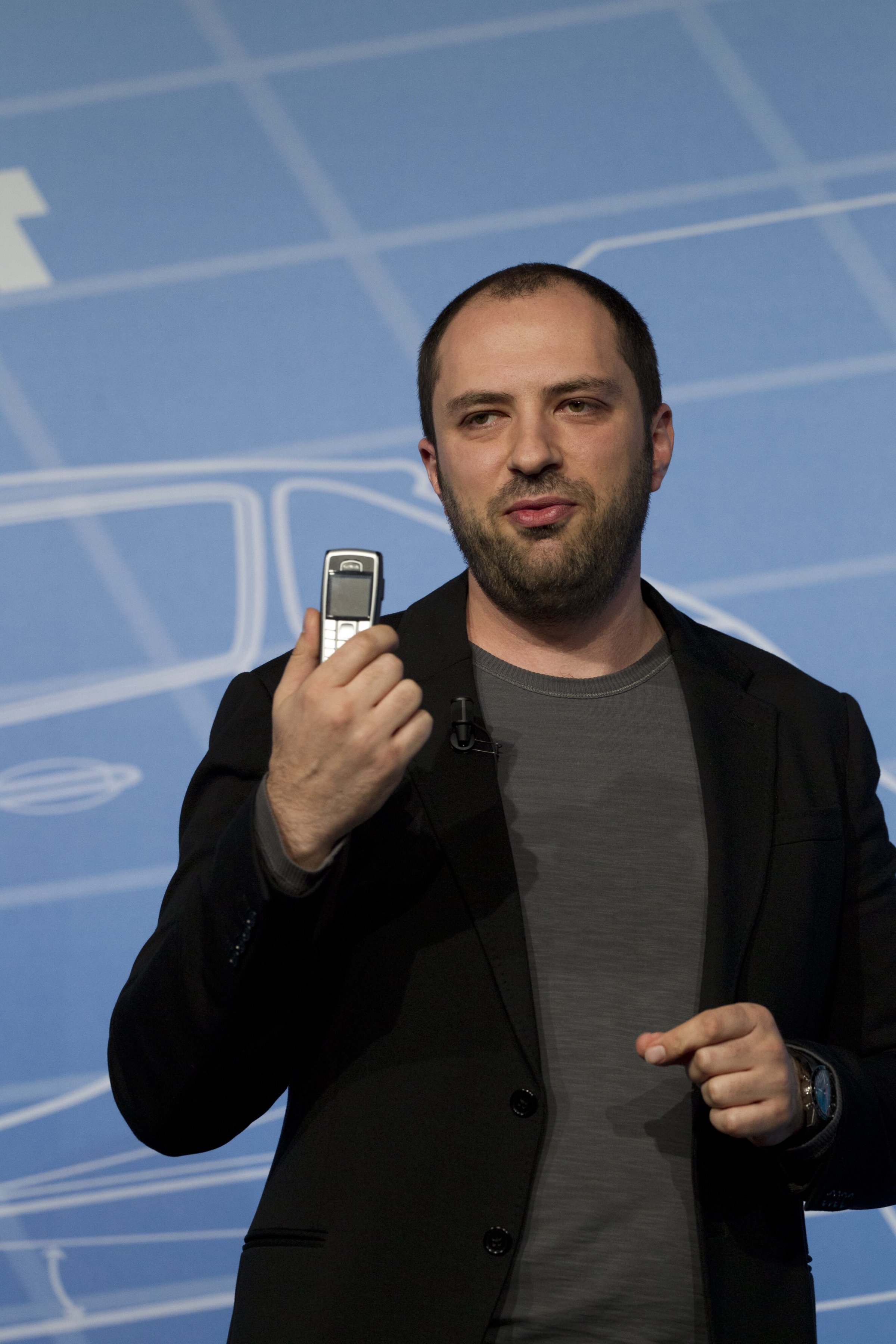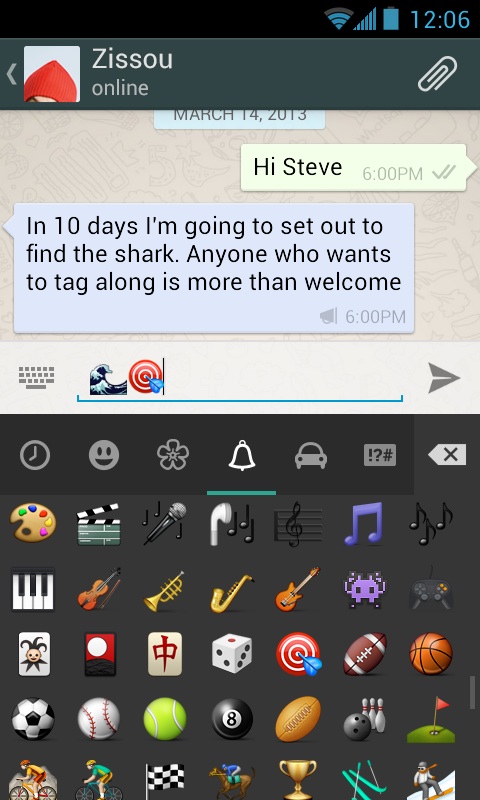
When Facebook announced its stunning agreement to acquire messaging app WhatApp last February for $19 billion in stock, cash and restricted stock units, Mark Zuckerberg said that the startup was on track to reach a billion users. That pretty much explained his interest: It’s a figure that doesn’t come up often when discussing networked services other than…well, Facebook.
As of today, it’s official: WhatsApp is halfway there.
In a blog post today, it’s announcing that the app has 500 million users–not just people who registered, but ones who are active participants. I recently sat down with CEO and cofounder Jan Koum at the company’s headquarters in Mountain View, Calif. to talk about the news.
Judging from its periodic statements over the past year, WhatsApp has been adding around 25 million new active users every month, a pace that isn’t slowing. The 500 million people now on board send tens of billions of text messages a day, along with 700 million photos and 100 million videos.
“On one hand, we were kind of expecting it,” Koum says of reaching the half-billion mark. “We got to 200 million users, 300 million users, 400 million users. It was going to happen sooner or later. But we think it’s an exciting number to share with the world and a good milestone to acknowledge what’s all been organic growth.”
In the U.S., WhatsApp is still probably best known as that company Facebook is in the process of buying. (The FTC signed off on the sale earlier this month–while emphasizing that WhatsApp must continue to abide by privacy promises it made to users–but other regulatory approvals are still pending internationally.) In much of the world, though, it’s already the app all your friends and relatives are using instead of carrier-provided text messaging.
Koum says that the app’s torrid growth tracks with the boom of smartphones–especially Android models. As people in a country join the smartphone era, some of them get WhatsApp. And then their friends and family members do, too, and the service explodes.

Right now, “the four big countries are Brazil, Mexico, India and Russia,” he says. “People who never used computers, never used laptops, never used the Internet are signing up.”
Rather than going after any particular country, Koum says, WhatsApp has always obsessed about the overall usage number. “We’re pretty confident that eventually we will a reach tipping point in the U.S. as well. Russia only tipped in the last six months. A switch flipped, and we took off.”
Though WhatsApp’s customer base may skew towards young people who like to share lots of quick messages and lots of photos, Koum says that it’s a mistake to assume that it’s just kids who are keeping the app growing. “We hear lots of stories where grandparents go to a store and buy a smartphone so they can keep in touch with kids and grandkids,” he says. That dynamic is helped by the app’s ridiculously easy setup–you don’t even have to create a user name or password–and features such as the ability to adjust the font size for easy readability.
The growth in smartphones isn’t enough to keep WhatsApp growing, however. There may be roughly two billion smartphones in the world, Koum notes, but between 500 million and one billion of them may be used without a data plan. In most cases, that’s because of cost, but the availability of Internet access isn’t a given everywhere.
“We take [connectivity] for granted in Silicon Valley, where you turn on your phone and see twenty different Wi-Fi networks,” he says. He told me how moved he’d been by a National Geographic photo showing people in Djibouti in the Horn of Africa standing on a beach with their phones in outstretched arms, trying to catch a stray wireless signal from neighboring Somalia, and says that he’s passionate about efforts such as Internet.org, a partnership between Facebook and mobile technology companies to bring Internet access to everybody, everywhere.
"We have no plans to change anything about how we execute."
Even in developed countries, “not everybody is on a data plan, which is unfortunate,” he says. So for the past two and a half years, WhatsApp has been busy partnering with wireless carriers around the world to offer affordable access to its service.
“We’ve done some really cool deals, and they’re not all cookie-cutter,” Koum explains. In India, you can sign up to get unlimited WhatsApp for 30 cents a month. In Hong Kong, you can buy a WhatsApp roaming pass. In Germany, there are WhatsApp-branded SIM cards, with unlimited WhatsApp service and starter credits for voice and data.
Rather than carriers looking at WhatsApp solely as a scary, disruptive force killing their ability to make money off text messaging, such offerings turn the service into a “win-win-win,” Koum says. “Users get unlimited WhatsApp. We get happy users who don’t have to worry about data. Carriers get people willing to sign up for data plans.”
The Future–and Oh Yeah, Facebook
For all of its growth, WhatsApp remains a famously lean operation: It got those 500 million active users with a team that only recently reached 60 staffers, for a ratio of over eight million users per employee. Koum says that the company doesn’t need to grow huge to serve even more folks. But “we do need more people–we’re actively hiring,” he says.
In particular, it’s beefing up its ability to provide customer support in more languages, including Portuguese, German, Ukranian, Polish and Romanian. “If anyone reading this article speaks multiple languages, they should apply,” he jokes.
When news of the Facebook acquisition broke, it inspired many people to worry about what it meant for the future of WhatsApp, whose business model has had a decidedly un-Facebookian slant in the past. The company makes money from customers–who pay 99 cents a year for service after the first year–and has been staunchly anti-advertising.
Both companies said at the time that WhatsApp would continue to be run independently and according to its existing principles, a point Koum stressed when I asked him about it.
“What makes our product work is the way we’re tightly focused on messaging and being an SMS replacement,” he says. The company plans to stick with that approach as it looks to “continuing to get to a billion users, and then two billion users. I think Facebook understands that, and Mark [Zuckerberg] understands that quite well. We have no plans to change anything about how we execute.”
As for competition from other messaging apps–and boy, is there a lot of it–Koum told me that some of WhatsApp’s rivals, such as Japan’s Line and China’s WeChat, are getting distracted from their core missions. People use WhatsApp, he says, to “keep in touch with each other, not movie stars or sports stars or random people you meet on the Internet. That’s why we’re succeeding internationally.”
“We want to do one thing and do it really well. For us, that’s communications between people who are friends and relatives.”
More Must-Reads from TIME
- Cybersecurity Experts Are Sounding the Alarm on DOGE
- Meet the 2025 Women of the Year
- The Harsh Truth About Disability Inclusion
- Why Do More Young Adults Have Cancer?
- Colman Domingo Leads With Radical Love
- How to Get Better at Doing Things Alone
- Michelle Zauner Stares Down the Darkness
Contact us at letters@time.com